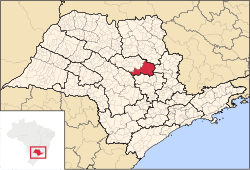Microregion of São Carlos
Microregion of São Carlos | |
|---|---|
Microregion | |
 Location of the Microregion of São Carlos | |
| Coordinates: 22°01′04″S 47°53′27″W / 22.01778°S 47.89083°W / -22.01778; -47.89083Coordinates: 22°01′04″S 47°53′27″W / 22.01778°S 47.89083°W / -22.01778; -47.89083 | |
| Country | |
| Region | Southeast |
| State | |
| Mesoregion | Araraquara |
| Area | |
| • Total | 3,185.4 km2 (1,229.9 sq mi) |
| Population (2010/IBGE) | |
| • Total | 308,777 |
| • Density | 97/km2 (250/sq mi) |
| Time zone | UTC-3 (UTC-3) |
| • Summer (DST) | UTC-2 (UTC-2) |
| Postal Code | 14000-000 |
| Area code(s) | +55 16 |
The Microregion of São Carlos (Portuguese: Microrregião de São Carlos) is located on the east-center of São Paulo state, Brazil, and is made up of 6 municipalities. It belongs to the Mesoregion of Araraquara.
The population of the Microregion is 308,777 inhabitants, in an area of 3,185.4 km²[1]
Municipalities
The microregion consists of the following municipalities,[2] listed below with their 2010 Census populations (IBGE/2010):[3]
Analândia: 4,293
Descalvado: 31,056
Dourado: 8,609
Ibaté: 30,734
Ribeirão Bonito: 12,135
São Carlos: 221,950
References
^ "2010 Census of the IBGE - Synopsis - Tables 761 and 1301" (in Portuguese). IBGE.gov.br. Retrieved 22 July 2011..mw-parser-output cite.citation{font-style:inherit}.mw-parser-output .citation q{quotes:"""""""'""'"}.mw-parser-output .citation .cs1-lock-free a{background:url("//upload.wikimedia.org/wikipedia/commons/thumb/6/65/Lock-green.svg/9px-Lock-green.svg.png")no-repeat;background-position:right .1em center}.mw-parser-output .citation .cs1-lock-limited a,.mw-parser-output .citation .cs1-lock-registration a{background:url("//upload.wikimedia.org/wikipedia/commons/thumb/d/d6/Lock-gray-alt-2.svg/9px-Lock-gray-alt-2.svg.png")no-repeat;background-position:right .1em center}.mw-parser-output .citation .cs1-lock-subscription a{background:url("//upload.wikimedia.org/wikipedia/commons/thumb/a/aa/Lock-red-alt-2.svg/9px-Lock-red-alt-2.svg.png")no-repeat;background-position:right .1em center}.mw-parser-output .cs1-subscription,.mw-parser-output .cs1-registration{color:#555}.mw-parser-output .cs1-subscription span,.mw-parser-output .cs1-registration span{border-bottom:1px dotted;cursor:help}.mw-parser-output .cs1-ws-icon a{background:url("//upload.wikimedia.org/wikipedia/commons/thumb/4/4c/Wikisource-logo.svg/12px-Wikisource-logo.svg.png")no-repeat;background-position:right .1em center}.mw-parser-output code.cs1-code{color:inherit;background:inherit;border:inherit;padding:inherit}.mw-parser-output .cs1-hidden-error{display:none;font-size:100%}.mw-parser-output .cs1-visible-error{font-size:100%}.mw-parser-output .cs1-maint{display:none;color:#33aa33;margin-left:0.3em}.mw-parser-output .cs1-subscription,.mw-parser-output .cs1-registration,.mw-parser-output .cs1-format{font-size:95%}.mw-parser-output .cs1-kern-left,.mw-parser-output .cs1-kern-wl-left{padding-left:0.2em}.mw-parser-output .cs1-kern-right,.mw-parser-output .cs1-kern-wl-right{padding-right:0.2em}
^ Instituto Brasileiro de Geografia e Estatística[permanent dead link], territorial division.
^ "2010 Census of the IBGE - Population - Table 2.1.20" (PDF). IBGE.gov.br. Retrieved 22 July 2011.
This geographical article relating to the state of São Paulo is a stub. You can help Wikipedia by expanding it. |